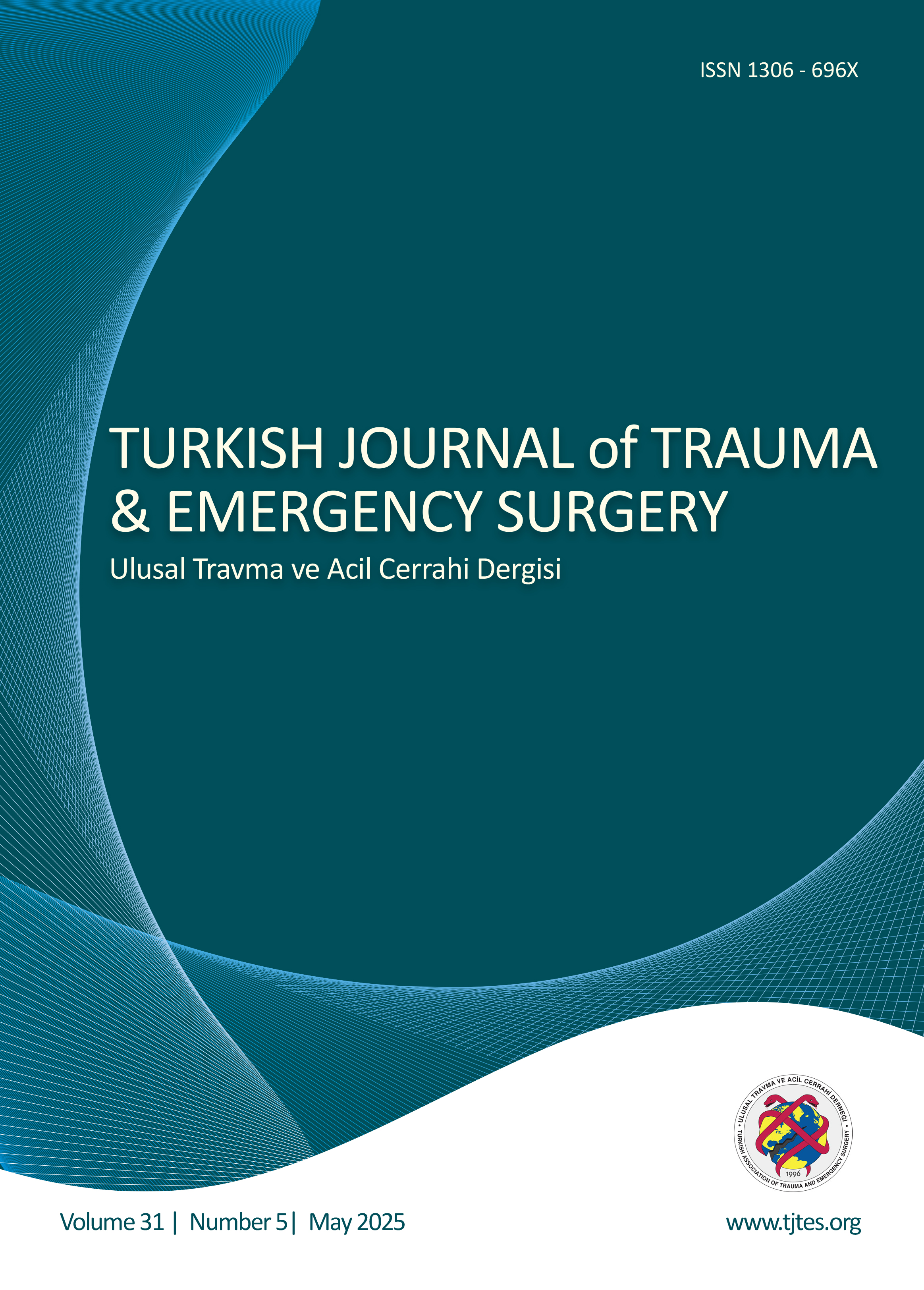Hızlı Arama
Koronavirüs hastalığı 2019 pandemisi sırasında tıkayıcı kolorektal kanser hastalarının klinik sonuçları
Cemil Burak Kulle1, Berke Sengun1, Ali Fuat Kaan Gok2, Ilker Ozgur1, Adem Bayraktar1, Cemalettin Ertekin1, Alisan Berk Deniz1, Metin Keskin11İstanbul Üniversitesi, İstanbul Tıp Fakültesi, Genel Cerrahi Anabilim Dalı, İstanbul, Türkiye2Hoca Ahmet Yesevi Uluslararası Türk-Kazak Üniversitesi, Kazakistan
AMAÇ: COVID-19 pandemisi, kolorektal kanserin (KRK) tanı ve tedavisi de dahil olmak üzere global olarak klinik hizmetlerin önemli bir kısmını etkiledi. Pandeminin zirve yaptığı ilk dönemde, sokağa çıkma yasağı uygulandı, elektif cerrahi ve poliklinik hizmetleri kısıtlandı. Bunun sonucunda kolonoskopi işlemlerinde ve hastaneye yatışta önemli bir azalış görüldü. Bu çalışmada, pandeminin tıkayıcı kolorektal kanserli hastaların hastaneye geliş özelliklerinde ve perioperatif sonuçları üzerine etkisini araştırmak hedeflendi.
GEREÇ VE YÖNTEM: Tek merkezli, retrospektif kohort olarak dizayn edilen bu çalışmada, yüksek hacimli, üçüncü basamak bir üniversite hastane-sinde kolorektal adenokarsinom tanısı ile ameliyat edilen hastalar dahil edildi. Hastalar Türkiyede COVID-19 tanısı alan ilk hastanın tanı tarihinden (18/03/2020) 15 ay önce ve sonra olmak üzere iki gruba ayrıldı. Hasta demografik bilgileri, ilk başvuru özellikleri, klinik sonuçlar ve patolojik veriler üzerinden karşılaştırıldı.
BULGULAR: Toplam 215 hasta kolorektal kanser ön tanısıyla 30 ay içinde ameliyat edildi. (COVID dönemi: 107, COVID öncesi: 108). Hasta de-mografik özellikleri, tümör yerleşimi ve klinik evreleme iki grup arasında benzerdi. COVID döneminde tıkayıcı KRK ile başvuran (p<0.01) ve acil başvuruda bulunan (p<0.01) hasta sayısı anlamlı olarak arttı. Fakat 30 günlük morbidite, mortalite ve patolojik sonuçlar arasında anlamlı fark yoktu (p>0.05).
TARTIŞMA: Çalışmada, pandemi dönemide acil başvuruda anlamlı artış ve elektif başvuruda azalma gözlense de COVID-19 döneminde ameliyat edilen hastalar postoperatif sonuçlar değerlendirildiğinde dezavantajlı değillerdi. Kolorektal kanserli hastaların acil başvuruları ile ilgili risklerin azaltıl-ması ile ilgili yapılacak çalışmalar olumsuz sonuçların azaltılmasında etkili olacaktır.
Anahtar Kelimeler: COVID-19, tıkayıcı tümörler; kolon kanseri; rektum kanseri; pandemi.
Clinical outcomes of obstructive colorectal cancer patients during the coronavirus disease 2019 pandemic
Cemil Burak Kulle1, Berke Sengun1, Ali Fuat Kaan Gok2, Ilker Ozgur1, Adem Bayraktar1, Cemalettin Ertekin1, Alisan Berk Deniz1, Metin Keskin11Department of General Surgery, Istanbul University, Istanbul Faculty of Medicine, İstanbul-Türkiye2Department of Surgery, Khoja Akhmet Yassawi International Kazakh-Turkish University School of Medicine, Kazakhstan
BACKGROUND: The coronavirus disease 2019 (COVID-19) pandemic has affected all aspects of clinical care including diagnosis and treatment of colorectal cancers (CRCs) globally, including in Türkiye. During the initial peak of the pandemic, elective surgeries and outpatient clinics were restricted in addition to the government-imposed lockdown, resulting in a decrease in the number of colonoscopies being performed and patients admitted to inpatient wards for treatment of CRCs. In this study, we aimed to investigate whether the pandemic has affected presentation characteristics and outcomes of obstructive colorectal cancer in this period.
METHODS: This is a single-center, retrospective cohort study based on all CRC adenocarcinoma patients that underwent surgical resection in a high-volume tertiary referral center in Istanbul, Türkiye. Patients were divided into two groups before and after 15 months of identification of patient-zero in Türkiye (March 18, 2020). Patient demographics, initial presentation characteristics, clin-ical outcomes, and pathological cancer stages were compared.
RESULTS: Overall, 215 patients underwent resection for CRC adenocarcinoma during 30 months (COVID era: 107, pre-COVID era: 108). Patient characteristics, tumor location, and clinical staging were comparable between two groups. During the COVID period, the number of obstructive CRCs (P<0.01) and emergency presentations (P<0.01) increased significantly compared to the respective pre-COVID period. However, there were no differences between 30-day morbidity, mortality, and pathological outcomes (P>0.05).
CONCLUSION: Although the results of our study indicate a significant increase in emergency presentation and a decrease in elective admissions of CRCs during the pandemic, patients treated during the COVID period were not at a significant disadvantage in terms of post-operative outcomes. Further efforts should be made to decrease risks related to an emergency presentation of CRCs for future adverse events.
Keywords: Bowel obstruction, colon cancer; COVID-19; pandemic; rectal cancer.
Makale Dili: İngilizce





